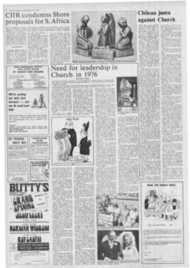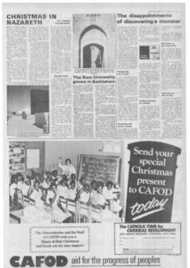Page 2, 26th December 1975
Page 2

Report an error
Noticed an error on this page?If you've noticed an error in this article please click here to report it.
Tags
Share
Related articles
Priests' Conference Proposes New Conciliation Plan
Bishops To Discuss English And Welsh 'missionary Areas'
Priests' Conference 'not A Union'
Right Man, Right Place, Right Time
The Communicators
Need for leadership in Church in 1976
By Peter Nolan
The Church in England and Wales is on the threshold of major changes in its leadership, with Westminster and Liverpool awaiting appointments and a plan to double the number of dioceses accepted. The year saw the death of Cardinal Heenan, one of the most distinguished princes of the Church Britain has had and the death of the Duke of Norfolk, its leading layman.
Dr Donald Coggan, the new Archbishop of Canterbury, soon after his enthronement this year, demonstrated a fresh style of leadership, calling all Christians to join in stopping the country's "drift into chaos" with its loss of spiritual values.
'Groundplan' accepted last year, whose details are still being worked out, will, when fully implemented, double the number of dioceses and their pastors to 37. fulfilling a long felt need for smaller, more meaningful Christian communities.
The liturgy was a subject which seemed to fill our letters bag to the exclusion of all else for a large part of this year. It often proved one where the recent advice of UNDA, the international Catholic Radio and Television Association, that laughter helps communication, had been well taken.
In April, Fr Michael Richards, editor of 'The Clergy Review', declared the Mass in English had descended to the level of a Bingo Hall, the 'players' shuffling through an ever-changing variety of leaflets with altering texts.
Agreeing with this, our more Conservative columnist went on to suggest attempts to introduce hymn singing made us sound "like American telephone operators" with faint croaks and whispers.
A reader informed him, however, that he would find "music simply oozing out of people" in everyday life. All that was needed to produce a singing Church was LID (Layman in distress) or (preferably), PID (Priest in Distress). Either, giving a lead in congregational singing, will quickly appeal to the listeners' compassion and a loud rescue operation will be mounted. In August, two laymen from what is traditionally the country's most 'Catholic' city, Preston, said they had already collected over 1,000 signatures to a petition to the bishops, asking them to curb "progressive liturgical playboys."
This was a reference to the hitherto unsuspected lighthearted and cheery character of the apparently sombre experts who had produced the new translations, In April the Bishops' Conference, on a more serious note, ruled that the Mass must be celebrated according to the rite of the Roman Missal of Pope Paul. This ruled out both 'trendy' innovations and the former Tridentine Rite, for which special permission is now required.
'the very genuine concern expressed by many over the continual chopping and changing this year resulted in a grudging official admission that the 'piecemeal' introduction of the translations and subsequent further alterations were originally designed to make
their acceptance easier. 'Vernacularisation,' to coin a neoliturgical phrase, has proceeded more smoothly in other languages, where a single standard translation was accepted by all at the beginning.
One Diocese has found difficulty not so much with the words said but the way they are expressed, and shaking hands at the kiss of peace in the Mass has been ruled out. It is understood that the suggestion of certain clerical playboys in our letters page, that congregations should adapt by "blowing kisses," has not found wide acceptance in Southwark.
Hopes that the Abortion Act, the death sentence of over half a million babies since 1968, might be restricted in its application, rose this year with Mr James White MP's proposed amendment. The Select Committee on Abortion, set up to look into the Amendment, dissolved with Parliament in November, its major work not yet embarked on. There is no guarantee it will he established and the Society for the Protection of Unborn Children and Life have both asked their supporters to write to their MPs to make sure it is. Over 70,000 turned out to support this plea at a giant antiabortion rally in Hyde Park in October.
While those under pressure to have an abortion are already helped by 'Lifeline,' Let Live' and other organisations, it would be nice to see the political campaigns turning more of their attention to securing adequate Government aid for the single parent family this year. The recommendations of the Finer Report for helping this group need to be implemented if the girl who has an abortion not because she wants to but because she simply cannot afford to bring up her child nor bear the thought of another doing it for her is to be assisted. The silence of Michael Litchfield and Susan Kentish, co-authors of 'Babies for the Burning', the book which documented the horrors of the 'abortion industry' earlier this year, should also end. Serious questions raised about it have not vet been answered.
The Prime Minister's reply to the late Cardinal Heenan's protest about the Department of Health circular which has in practice closed posts in four medical specialisations in State hospitals to those opposed to abortion must not he the end of the matter.
It was encouraging to learn this month that Whittington Hospital, Highgate, London, was one which refused to perform 'social' abortions during the staff shortage caused by doctors' disputes. The rejecting of the 'social reasons' abortion cut the monthly number 90 per cent and suggested a general feeling among part of the medical profession that there ' are greater medical priorities. Catholic schools have again been in the news, a Catholic Direct Grant Action Committee forming to try and save the 54 Catholic direct grant schpols due to be phased out next year. Two have so far 'gone independent' and opted out of' the State system.
The survival of this form of grant system, which underwrote Grammar School standards, was so hotly defended in our pages by the Opposition spokesman on education that Kevin McNamara, MP, replying in his column, had to point out that it was not "the fifth mark of the Church."
The Government cut-back in teacher training places to adapt teacher supply to the falling school population, announced this year, leaves only four of the 15 Catholic College of Education remaining as single-subject colleges. Mary Ward, Nottingham, St Paul's, Rugby, Coloma College, Kent and Maria Assumpta, London, are all to close. The remainder are either amalgamating with one another or other Colleges in ,some form of association providing multi-disciplinary degrees.
The Catholic Education Council has expressed itself satisfied that the rearrangement will still maintain Catholic interests in this area.
The National Conference of Priests was the subject of votes of no confidence for the first time this year. One age group entitled to send a delegate from Cardiff Diocese decided they could not be bothered. At the Conference in September, Canon Beausang of Southwark resigned on the grounds that he felt the NCP did not represent priests generally.
The NCP, in a carefully weighted memorandum, criticised the Bishops of England and Wales for general lack of leadership and failure to really implement the decrees of the Second Vatican Council. It emphasised the important role that the laity should play in the Church "given the nature of British secular society."
This laity still awaits the final report of the joint NCP/Bishops Conference working party on pastoral policy to the end of the century, 'The Church 2,000.' Comments on the interim report were in months ago. We can only hope it will provide practical guidelines encouraging positive participation and appropriate leadership lacking in a Church that still tends to feel itself a persecuted minority, entitled only to keep a low profile.
This lack of self-confidence makes it constitutionally unable to respond to the call Of the last Synod of Bishops, elaborated last week by Pope Paul, to evangelise and liberate society. With a message that has particular relevance for Britain, the Pope said: "We are thinking especially of the responsibility incumbent upon immigrants in the country that receives them."
A pamphlet published this month by the Justice and Peace Commission, which received more attention from the media than many of its predecessors (even winning a page in 'The Economist'), illustrates this very lack of will of the Church to play its due part in a pluralistic society.
Its author, Richard Dowden, pointed out the British Church's failure, despite its inbuilt advantages, to act as reconciler in the Northern Ireland situation. Beyond asking for prayer and condemning violence, it did little to help. He described the English Church as a 'castle standing firm against the world' rather than "a community existing for the service of the world and its real needs, losing its life in the life of the world and evangelising not through proselytising and persuasion, but by a witness to truth and love in the lifestyle of its members,"
Perhaps that's a thought that should he borne in mind for 1976 when we come to make our New Year resolutions in a few days.
blog comments powered by Disqus









